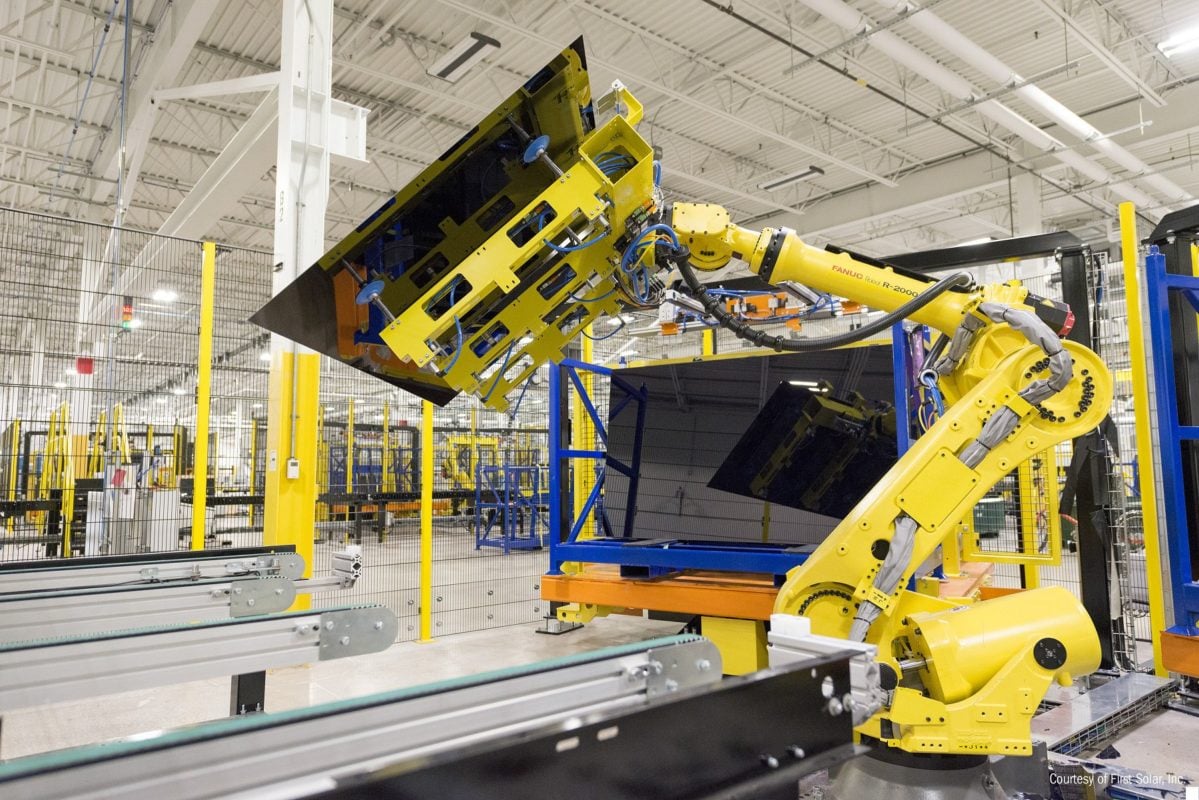
‘Solar Module Super League’ (SMSL) member First Solar is undertaking capacity expansions at its two existing manufacturing plants in Ohio, while evaluating several new international locations to grow its global module sales business as initial Series 6 CdTe thin film module expansion plans come to an end, effectively becoming capacity constrained again from 2021, onwards.
In its latest third quarter earnings call, First Solar’s management noted that its Ohio 1 fab was operating at 109% (average) capacity utilisation rate, while Ohio 2 fab had been averaging rates of 121% from September, through to October 2020.
Try Premium for just $1
- Full premium access for the first month at only $1
- Converts to an annual rate after 30 days unless cancelled
- Cancel anytime during the trial period
Premium Benefits
- Expert industry analysis and interviews
- Digital access to PV Tech Power journal
- Exclusive event discounts
Or get the full Premium subscription right away
Or continue reading this article for free
Additional tools will be installed at both facilities with the aim of reducing the manufacturing cost per watt as these plants have the highest production costs compared to its facilities in Malaysia and Vietnam.
The Ohio facilities were also said to have lower overall fleet average Series 6 module yields compared to its facilities in Malaysia and Vietnam. The new tools are to support the Ohio fabs cost per watt premium to narrow to US$0.02 over time.
From a manufacturing optimisation perspective, First Solar will operate both facilities as a ‘virtual’ single facility that is expected to initially improve nameplate capacity by more than 25%, or around 600MW. This would equate to the Ohio fabs' unified annual nameplate capacity reaching 2.4GW by the end of 2021, according to the company.
Ohio 1 fab had an initial nameplate capacity of 600MW, while Fab 2 was built with 1.2GW of nameplate capacity, a combined 1.8GW.
New international capacity expansion plans
First Solar expects to have around 8GW of Series 6 module manufacturing capacity by the end of 2021, with its second Malaysian fab being fully transitioned from the legacy Series 4 module to Series 6 in the first quarter of 2021.
However, First Solar already has 6.7GW of contracted module deliveries in 2021 and booked 1.6GW of new business in the third quarter of 2020 alone. First Solar’s ‘late stage’ module bookings pipeline was said to total around 7.7GW, which typically translates to module sales that could be booked in the next 12 months.
The company has a much larger pipeline of opportunities in 2022 and beyond that were said to currently stand at around 16GW.
In the earnings call, Mark Widmar, CEO of First Solar hinted that new capacity expansions were likely to occur in countries such as Germany and India as new expansions in the US would not achieve the lowest average production costs per watt.
The attraction of Germany was due to previously operating two manufacturing plants in the country, coupled to the EU’s new Green Deal, and the aim of being a carbon neutral economy by 2050, providing significant long term support for solar installations.
Widmar also referenced the low carbon manufacturing footprint of CdTe thin film modules and the impact of shipping costs in the era of large-area modules, which negatively account for 6% of gross margin and 6% of ASPs, currently.
“And so getting closer to market and driving down your freight costs is an advantage that we continue to look to,” Widmar said in the earnings call. “So being in a market that can consume 2.5 to 5 gigawatts of volume on a recurring basis, it would be important. So those are the many different factors that we look at as we think about expansion. And but just want to make sure it is clear that is on the agenda of things that we're looking at this point.”
Also in the earnings call, Widmar noted the long-standing operating performance benefits of CdTe thin film modules temperature coefficient in hot and humid regions, notably India, compared to conventional polycrystalline and monocrystalline modules.
First Solar has built, operated, and sold utility-scale PV power plants in India for many years but has not established a manufacturing presence in the country, which also has long-term solar installation targets and has attempted to introduce effective policies to support PV manufacturing in the country and limit imports.
“It's, whenever we grow, we want to make sure that it's tied to a market indicator, right. And basically really has to start with relative competitive advantage and position of the technology, the market has to be there, right and good thing about where we are now with solar procurement, it used to be policy lead now it's economic procurement, people are buying solar from the pure economic standpoint. And so I don't really see any constraints on the market, per se. But we do look to markets where we would have advantages around our technology. So hot, humid climates, for example, would be a market, they would be attractive to us; again, being closer to the market, or at least driving efficient shipment, logistics routes to access the market is important,” noted Widmar.
With the stated demand for its Series 6 modules, the next wave of capacity expansions may not be consigned to one region.






